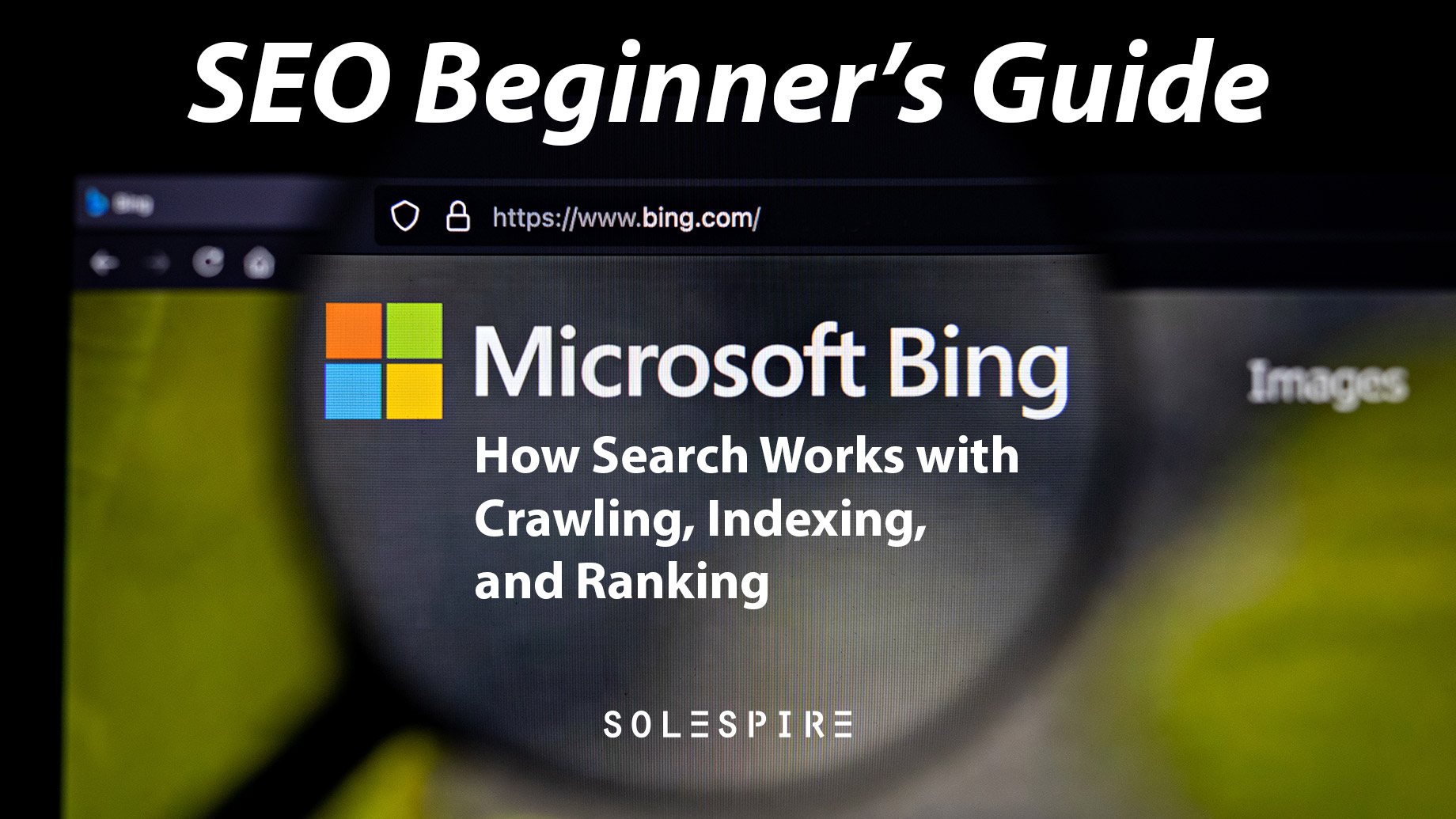
Microsoft Bing is a search engine that allows users to find websites, images, and other information on the internet. Like other search engines, Bing uses algorithms to crawl, index, and rank websites based on their relevance and quality.
In brief, here’s what that means:
- Crawling is the process of discovering new and updated pages to be added to the Bing index. Bing uses web crawlers to find new pages and follow links from pages it has already indexed. As the crawlers visit these pages, they extract the content and metadata to be added to the Bing index.
- Indexing is the process of organizing and storing the data extracted from web pages in a way that allows it to be searched efficiently. When a page is indexed, it is added to the Bing database and can be returned in search results.
- Ranking is the process of determining the order in which search results are displayed based on the relevance and quality of the pages. Bing uses a variety of factors to rank pages, including the content of the page, the relevance of the page to the search query, the quality of the website, and the performance of the website.
Now, let’s dive deeper into the factors that make Bing operate as one of the most popular search engines in the world:
Crawling
Bing crawling is the process by which Bing discovers new and updated web pages to be added to its index. Bing uses web crawlers, also known as spiders or bots, to explore the internet and find new pages to add to its index. When a crawler visits a page, it follows links on the page to other pages within the same website and to other websites. This process allows Bing to discover new pages and keep its index up to date.
There are a few factors that can affect how quickly and how often Bing crawls a website. One of the main factors is the frequency with which the website is updated. Websites that are frequently updated with new content are more likely to be crawled more often by Bing. Additionally, the organization of a website’s internal links and the use of sitemaps can help Bing discover new pages on the website more easily.
It is important to note that Bing, like other search engines, has a finite amount of resources that it can devote to crawling. As a result, it may not be possible for Bing to crawl all pages on the internet with the same frequency. This is particularly true for websites with a large number of pages or those that are not frequently updated. It is, therefore, important for website owners to prioritize the pages they want Bing to crawl by using techniques like internal linking and sitemaps.
When Bing does not crawl a web page
- The page is blocked from being crawled by robots.txt: Webmasters can use the robots.txt file to indicate to search engines which pages on their website should not be crawled. If a page is blocked by the robots.txt file, Bing will not crawl it.
- The page is not linked to from any other pages: Bing relies on links to discover new pages. If a page is not linked to from any other pages, it is unlikely that Bing will discover it.
- The page has a noindex tag: Webmasters can use the “noindex” tag in the page’s HTML to indicate that the page should not be indexed by search engines. If a page has a noindex tag, Bing will not crawl it.
- The page has a low PageRank: PageRank is a measure of the importance of a page, determined by the number and quality of links pointing to it. Pages with a low PageRank are less likely to be crawled by Bing.
- The website has a low crawl budget: Search engines have a limited amount of resources that they can devote to crawling the web. If a website has a low crawl budget, it may not be crawled as frequently by Bing.
Improve your crawling
- Make sure your website is accessible to Bing: This means ensuring that there are no technical issues that would prevent Bing from accessing your website. This includes checking for crawl errors in Bing Webmaster Tools and fixing any issues.
- Use sitemaps: Sitemaps are files that list all of the pages on your website and provide information about when each page was last updated. Submitting a sitemap to Bing can help the search engine discover new pages on your website more easily.
- Use internal linking: Internal linking, or linking to other pages on your website, can help Bing discover new pages on your website and understand the hierarchy of your content.
- Keep your website up to date: Websites that are frequently updated with new content are more likely to be crawled more often by Bing.
- Use descriptive and relevant page titles and meta descriptions: Page titles and meta descriptions are used by Bing to understand the content of your pages and to display them in search results. Using descriptive and relevant titles and meta descriptions can help improve the visibility of your pages in Bing search results.
- Use relevant and high-quality external links: Links from other websites can help improve the visibility of your website in Bing search results. However, it is important to ensure that the links are relevant and from high-quality websites.
- Avoid using techniques that try to trick search engines: Bing and other search engines do not tolerate attempts to manipulate their algorithms. Using techniques like cloaking, keyword stuffing, and link schemes can result in your website being penalized or banned from Bing search results.
Indexing
Bing indexing is the process of organizing and storing the data extracted from web pages in a way that allows it to be searched efficiently. When a page is indexed, it is added to the Bing database and can be returned in search results.
During the indexing process, Bing analyzes the content of a web page and extracts information such as the page’s title, headings, and main body text. It also looks at metadata, such as the page’s title tag and meta description, to understand the content and context of the page.
Bing uses algorithms to determine the relevance and quality of a web page and assign it a ranking. This ranking is used to determine the order in which pages are displayed in search results.
Ranking and Visibility
After a user performs a search, Bing ranks the pages in its index according to their relevance to the user’s query. This ranking is determined using a complex algorithm that takes into account various factors, including the quality and relevance of the content on the page, the number and quality of external links pointing to the page, and even the website’s speed performance.
There are a variety of factors that can affect a page’s ranking and visibility on Bing. These may include the content of the page, the relevance of the page to the search query, the quality of the website, and the performance of the website.
Improving your website’s ranking and visibility on Bing involves optimizing it to be more relevant, informative, and of high quality. This may involve creating well-written and informative content, using relevant keywords, and ensuring that your website is easy to navigate and use. It may also involve improving the technical aspects of your website, such as its loading speed and mobile-friendliness. By improving your website’s ranking and visibility on Bing, you can increase the likelihood that users will see and click on your website in the search results.
Search Results
When a user conducts a search on Bing, the search engine returns a page of results, known as the SERP. The SERP includes a list of web pages, images, and other types of content that are relevant to the search query.
The order in which the results are displayed on the SERP is determined by Bing’s ranking algorithms, which evaluate the relevance and quality of the pages and rank them accordingly. The pages that rank higher on the SERP are more visible and are more likely to be clicked on by the user.
In addition to the main results, the SERP may also include other types of content, such as sponsored results, local results, and knowledge panel results. Sponsored results are paid advertisements that are displayed on the SERP. Local results are results that are specific to a particular location. Knowledge panel results are information boxes that display detailed information about a particular topic or entity.
The most common Bing SERP features are:
- Web page results: These are the main results that are displayed on the SERP and include links to web pages that are relevant to the search query.
- Sponsored results: These are paid advertisements that are displayed on the SERP. They are typically labeled as “Sponsored” or “Ad” and may be displayed at the top or bottom of the SERP.
- Knowledge panel: The knowledge panel is a box that appears on the right-hand side of the SERP and provides detailed information about the search query, such as a brief summary, key facts, and links to related topics.
- Local results: These are results that are specific to a particular location and may include businesses, attractions, or events in the area.
- Rich snippets: Rich snippets are enhanced search results that provide additional information about the content of a web page. They may include information such as the page’s title, a brief summary of the content, ratings, or prices.
Overall, the SERP is an important factor in determining the visibility and success of a website in search results. By optimizing your website for the SERP, you can increase its visibility and drive more traffic to your website.
Knowledge Graph
The knowledge graph is a system that Bing uses to provide users with detailed and accurate information about specific topics or entities. The knowledge graph is populated with information from a variety of sources, including Wikipedia, Bing’s own database, and other trusted sources.
When a user conducts a search on Bing, the search engine may use the knowledge graph to provide additional information about the search query in the form of a “knowledge panel.” The knowledge panel is a box that appears on the right-hand side of the search results and provides detailed information about the query, such as a brief summary, key facts, and links to related topics.
Rich Snippets
Rich snippets are enhanced search results that provide additional information about the content of a web page. They are designed to give users a better understanding of the content of a page and to help them decide whether it is relevant to their search query. Rich snippets may include information such as the page’s title, a brief summary of the content, ratings, or prices.
Bing supports a variety of rich snippets, including those for products, events, recipes, and reviews. To enable rich snippets for your website, you can use structured data markup in the HTML of your pages. Structured data markup is a way to annotate your content in a way that makes it easier for search engines to understand and display it in search results.
Optimizing Your Website for Bing
Now that you understand the basics of how Bing’s search process works, you may be wondering how you can optimize your website to improve its visibility on Bing. Here are five key steps you can take:
- Make sure your website is easy for Bing’s spiders to crawl by organizing your content into clear and logical categories and using descriptive, keyword-rich URLs for each page.
- Use keywords throughout your website’s content to help Bing understand what your pages are about and improve their relevance to users’ search queries.
- Acquire high-quality backlinks from other reputable websites to improve the perceived authority and trustworthiness of your website in Bing’s eyes.
- Make sure your website loads quickly and is mobile-friendly to provide a good user experience and improve your rankings on Bing.
- Use Bing Webmaster Tools to submit your sitemap and help Bing discover and index all of your website’s content.
By following these tips, you can improve your website’s visibility on Bing and drive more traffic to your site.
Bing vs. Google
While Bing is one of the most popular search engines, it is not the only one. Google is the dominant search engine, with a market share of over 90% in many countries. So, why should you consider optimizing your website for Bing at all?
First and foremost, while Google may be the most popular search engine, Bing is still a significant player. In the United States, Bing has a market share of around 6.75%, which is more than double the global market share rate, and in other parts of the world. Additionally, Bing powers the search results for many other sites, including Yahoo and DuckDuckGo, so optimizing for Bing can help improve your visibility on these search engines as well.
Moreover, even if most of your potential customers use Google, optimizing for Bing can still be beneficial. This is because Google uses algorithms to rank pages that differ from Bing’s algorithms, as you will learn in our SEO Beginner’s Guide for How Google Search Works, so optimizing for one search engine may not necessarily improve your rankings on the other. Additionally, Bing and Google have different users, thus optimizing for Bing can help you reach a new audience that you may not be reaching with Google.
The Future of Bing
Bing has come a long way since it was launched by Microsoft in 2009, and it continues to evolve and improve. In recent years, Bing has made significant strides in areas such as artificial intelligence and natural language processing, and it has integrated these technologies into its search engine to provide users with more relevant and useful results.
One of the most notable examples of this is Bing’s integration of Microsoft’s Cortana digital assistant into its search engine. This allows users to perform more complex, conversational searches and receive more personalized results based on their search history and preferences.
Bing has also made strides in improving the user experience of its search engine. For example, it has introduced features such as image search, which allows users to search for images using keywords, and map search, which provides detailed maps and directions for locations around the world.
Overall, it is clear that Bing is committed to improving its search engine and providing users with the best possible experience. As a result, optimizing your website for Bing is likely to become even more important in the future, especially with reports signalling that Microsoft is readying Bing to incorporate OpenAI’s ChatGPT.
Bing + ChatGPT
ChatGPT is a large language model trained by OpenAI that can generate human-like text based on a given prompt. It has the ability to continue a given conversation or write original content on a wide range of topics. As such, it has the potential to be a valuable tool for Bing in several ways.
One potential use for ChatGPT on Bing would be to improve the search engine’s ability to understand and respond to complex, conversational queries. By integrating ChatGPT into its search algorithm, Bing could provide more relevant and personalized results for users who use natural language to search for information.
Another potential use for ChatGPT on Bing would be to generate content for the search engine’s featured snippets. Featured snippets are brief answers to users’ search queries that appear at the top of the search results page. By using ChatGPT to generate high-quality, relevant content for these snippets, Bing could provide users with even more useful information directly in the search results.
Additionally, ChatGPT could be used to improve Bing’s knowledge graph, which is a collection of information about various entities and their relationships with each other. By using ChatGPT to generate and curate high-quality information for the knowledge graph, Bing could provide users with even more comprehensive and accurate answers to their search queries.
Conclusion
Overall, the future of Bing’s search engine is likely to be characterized by continued innovation and the integration of new technologies. By leveraging advances in artificial intelligence, machine learning, and natural language processing, Bing could provide users with an even better search experience and more relevant and personalized results for their queries.
As such, Bing is a significant player in the search engine market, and understanding how it works can help you optimize your website and improve its visibility on Bing. By following best practices for SEO, acquiring high-quality backlinks, and making sure your website is mobile-friendly and loads quickly, you can improve your website’s rankings on Bing and drive more traffic to your site.
Our team of SEO experts at Solespire stays up-to-date with the constantly changing Bing algorithm. We use Multiplex, our custom media stack designed to be responsive and utilize the latest web design practices and technologies, helping us to effectively market content from all Solespire Sites on evolving media platforms.

